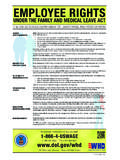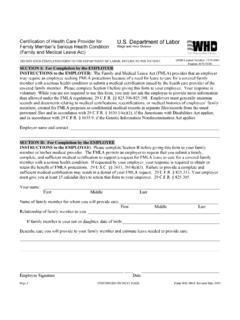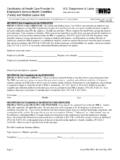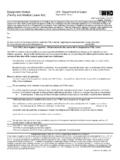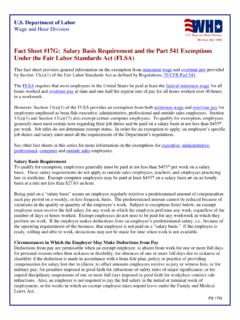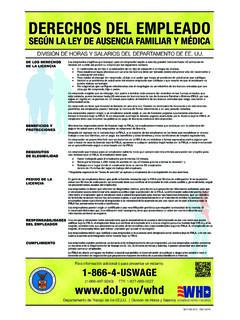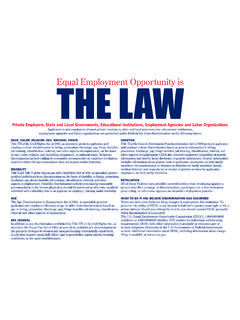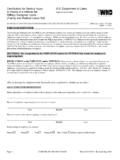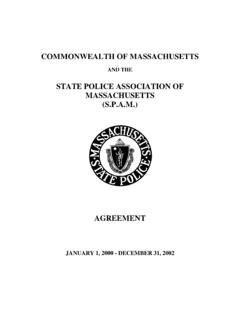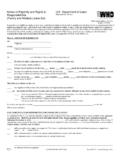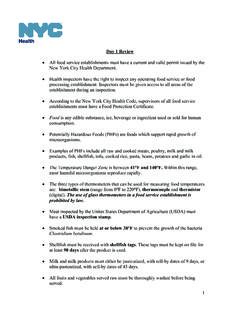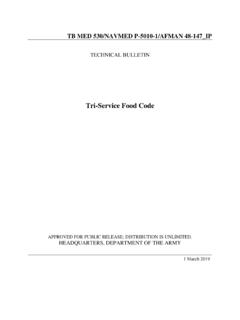Transcription of Fact Sheet #20: Employees Paid Commissions By Retail ...
1 Department of Labor Wage and Hour Division (Revised July 2008) Fact Sheet #20: Employees Paid Commissions By Retail Establishments Who Are Exempt Under Section 7(i) From Overtime Under The FLSA This fact Sheet provides general information concerning the application of the Section 7(i) overtime exemption from the FLSA to Employees of Retail and service establishments, who are paid on a commission basis in whole or part. Characteristics Retail and service establishments are defined as establishments 75% of whose annual dollar volume of sales of goods or services (or of both) is not for resale and is recognized as Retail sales or services in the particular industry.
2 Requirements If a Retail or service employer elects to use the Section 7(i) overtime exemption for commissioned Employees , three conditions must be met: 1. the employee must be employed by a Retail or service establishment , and 2. the employee's regular rate of pay must exceed one and one-half times the applicable minimum wage for every hour worked in a workweek in which overtime hours are worked, and 3. more than half the employee's total earnings in a representative period must consist of Commissions . Unless all three conditions are met, the Section 7(i) exemption is not applicable, and overtime premium pay must be paid for all hours worked over 40 in a workweek at time and one-half the regular rate of pay.
3 The representative period for determining if enough Commissions have been paid may be as short as one month, but must not be greater than one year. The employer must select a representative period in order to determine if this condition has been met. If the employee is paid entirely by Commissions , or draws and Commissions , or if Commissions are always greater than salary or hourly amounts paid, the-greater-than-50%- Commissions condition will have been met. If the employee is not paid in this manner, the employer must separately total the employee's Commissions and other compensation paid during the representative period. The total Commissions paid must exceed the total of other compensation paid for this condition to be met.
4 To determine if an employer has met the "more than one and one-half times the applicable minimum wage" condition, the employer may divide the employee's total earnings attributed to the pay period by the employee's total hours worked during such pay period. If the result is greater than time and one-half the minimum wage, this condition of the exemption has been met. Hotels, motels and restaurants may levy mandatory service charges on customers which represent a percentage of amounts charged customers for services . If part or all of the service charges are paid to service Employees , that payment may be considered commission and, if other conditions in section 7(i) are met, the service Employees may be exempt from the payment of overtime premium pay.
5 FS 20 Typical Problems Regulations require that employers maintain accurate records of hours worked each workday, hours worked each workweek, and earnings and wages paid. Without hours worked and earnings records, the employer will be unable to substantiate that all conditions for the exemption have been met. In addition, the employer must select a representative period of at least one month, but not more than one year, which typifies the characteristics of the employee's earning pattern, in order to test whether the employee is paid principally by Commissions . Tips paid to service Employees by customers may never be considered Commissions for the purposes of this exemption.
6 An employee is employed by the central office of a Retail chain enterprise as a sales instructor working in the various Retail establishments. Since this employee is employed by the central office and not "by" the Retail " establishment ", the exemption does not apply. Where to Obtain Additional Information For additional information, visit our Wage-Hour website: and/or call our Wage-Hour toll-free information and helpline, available 8am to 5pm in your time zone, 1-866-4 USWAGE (1-866-487-9243). This publication is for general information and is not to be considered in the same light as official statements of position contained in the regulations. Department of Labor 1-866-4-USWAGE Frances Perkins Building TTY: 1-866-487-9243 200 Constitution Avenue, NW Contact Us Washington, DC 20210
